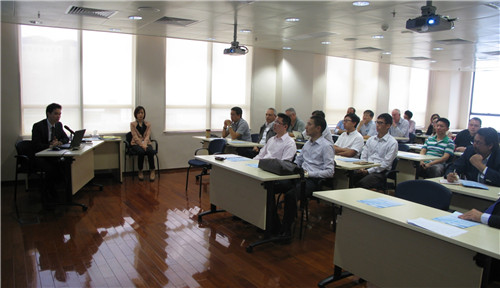
 {{_.$tools.formatDate(item.publishTime, 'yyyy-MM-dd')}} {{item.title}}
{{_.$tools.formatDate(item.publishTime, 'yyyy-MM-dd')}} {{item.title}} 
“Civil Aviation Accident and Incident Investigation and Aviation Safety Information Protection Law” will become effective tomorrow, and Macao Confidential Aviation Reporting System will be operational

“Civil Aviation Accident and Incident Investigation and Aviation Safety Information Protection Law” will become effective tomorrow, and Macao Confidential Aviation Reporting System will be operational 2013-05-20
The Law No. 2/2013 - “Civil Aviation Accident and Incident Investigation and Aviation Safety Information Protection Law” which was passed by the Legislative Assembly in January this year will become effective tomorrow (21 May 2013), signifying that the investigation of civil aviation accidents and incidents held responsible by the Macao SAR Government and the handling and protection of safety information will then be governed by an independent and robust legal framework, with the principles relating the relevant work being clearly defined. In addition, the “Macao Confidential Aviation Reporting System (MACCARES)” which must be operational with the legal support of the Law No. 2/2013 will commence its operation tomorrow. It is a system which collects safety information and identifies safety threats so that data can be analyzed and generated, and safety alerts can be issued to prevent the occurrence of accidents and incidents.
The Law No. 2/2013 is applicable in the following three scenarios: accidents and incidents that take place in Macao or in the airspace under Macao’s jurisdiction; aircraft registered in Macao or accidents and incidents with aircraft operated by a local air operator certificate holder that take place in a foreign country; aviation safety data collection and handling system established in Macao. When one of the above scenarios takes place, the operator, the aircraft owner, the captain and the airport or heliport are bound by their legal responsibilities to make compulsory reporting to the Civil Aviation Authority of Macao SAR (AACM) in order that AACM can carry out the investigation in accordance with the power given to them by the law.
When an accident or serious incident happens, AACM will designate an investigator-in-chief and appoint other members to form an investigation team. The investigator-in-chief enjoys independence and complete power, and ensures that all the investigation work is compliant with the Law No. 2/2013 and the standards and recommended practices of International Civil Aviation Organization. The work involved in an investigation includes collecting, recording and analyzing all information, devising the reports in various stages, and identifying the root cause or contributing factors in the final report, and so on. During the process, AACM can request the experts from the government or private entities from both local or overseas to participate in the investigation. The final report will be published after completion. In addition, if an accident or incident involves the investigation by the judiciary police authorities or the criminal investigative bodies in accordance with the relevant regulations on criminal legal proceedings, the investigation by AACM and the investigation by those authorities will be carried out simultaneously but independently. However, the two parties should cooperate with each other to ensure that the simultaneous investigation will be carried out in an effective way.
AACM states that it is compulsory to investigate into accidents and serious incidents by law. However, the objective of investigation is to find out the cause to avoid similar occurrences from taking place. It is not the objective to apportion blame or responsibility. This is also the safety policy of the Authority.
Furthermore, AACM points out that the sole objective of collecting and handling safety information is to improve aviation safety and prevent accidents and incidents. Therefore, the Authority will analyze and handle the information obtained from any reporting system or safety database. The Authority will ensure, internally and externally, the confidentiality of the source of information, avoid the improper use of the information and make sure information will be collected on a continual basis.
Before the Law No. 2/2013 has become effective, AACM carried out the accident and incident investigation according to Annex 13 of the Convention of International Civil Aviation which is applicable to Macao, the AACM organizational statute and the aeronautical circular that governs rules concerning aeronautical accidents and incidents. In the past, the Accident Prevention and Investigation Group (APIG) was only a permanent unit in AACM’s organizational structure. It was only mobilized when an emergency took place. The president of AACM would check the nature of the emergency and appoint appropriate personnel to join this group to carry out the investigation work. Then in 2009, Macao participated in the “Universal Safety Oversight Audit Programme” which was conducted by the International Civil Aviation Organization to check the safety oversight work of Macao. The Organization reported a finding that the accident and incident investigation work should be governed by a higher ranking legal document. In addition, the Organization also requested that all countries or administrations should be equipped with a voluntary incident reporting system. AACM established an accident and incident ad hoc working group to study the draft law on accident and incident investigation that is suitable for Macao, taking into reference similar legal documents and practices in mainland China, Portugal, Canada, the United States, Australia, Singapore and Hong Kong. At the same time, the ad hoc working group also worked on the preparation of a safety data reporting system built on the voluntary, confidential and non-punitive principle which is named MACCARES.
In accordance with MACCARES, any person who notices an occurrence or an act of non-compliance relating to aviation safety can complete the reporting form with the necessary information and then send it by post or through email to the Authority. Safety information collected by AACM through MACCARES will be analyzed. Statistical reports with de-identified data will be generated, published and shared with the industry so that each entity can learn from experience and make improvement. In the case if a report shows a situation that poses immediate threat to aviation safety, AACM will address a safety alert to the concerned operator at the earliest time. The system works on the confidential and non-punitive principle and AACM will not penalize the operators or any person by using the information collected from this reporting system.
In order that the operators can better understand the Law No. 2/2013 and encourage them to participate actively in MACCARES, AACM has started promoting the two things to the industry since March this year. The Authority will continue to conduct sessions in Chinese and English for different categories of industry personnel to explain to them the law, as well as the objective of MACCARES, how the industry can participate, how the information will be used, how the reporter will be protected by the confidential and non-punitive principles.
The APIG has become a permanent functional unit in AACM since 1 May 2013. Apart from their duties in accident and serious incident investigation whenever an emergency arises, the unit is also embodied with daily tasks for aviation safety enhancement, including review on a regular basis the laws, regulations and procedures related to accident and incident investigation and propose any updates in order to ensure compliance with international standards and their applicability in Macao; administrate and analyze safety information database; prepare, organize and publish statistics, alerts or safety recommendations when appropriate; promote the establishment and the coordination of the system and procedures for search and rescue operations involving civil aircrafts; ensure confidentiality and proper use of safety data; administrate MACCARES; participate in activities organized by international or regional organizations relevant to investigations and prevention of accidents and incidents; facilitate intra-Macao and inter-state/region safety data sharing.

The Civil Aviation Authority of Macao SAR has been organizing a number of promotional sessions since March 2013 targeting at different category of personnel in the aviation industry, to explain the provisions of the Law No. 2/2013 - “Civil Aviation Accident and Incident Investigation and Aviation Safety Information Protection Law” and introduce the objective of and the mode of participation for “Macao Confidential Aviation Reporting System (MACCARES)”.
-
Previous
Civil Aviation Authority urges passengers to pay attention to the requirement on the carriage of lithium batteries on aircraft -
Next
AACM organized the ICAO Safety Management Systems Course to enhance industry’s knowledge on safety management with the objective of improving operational safety
























